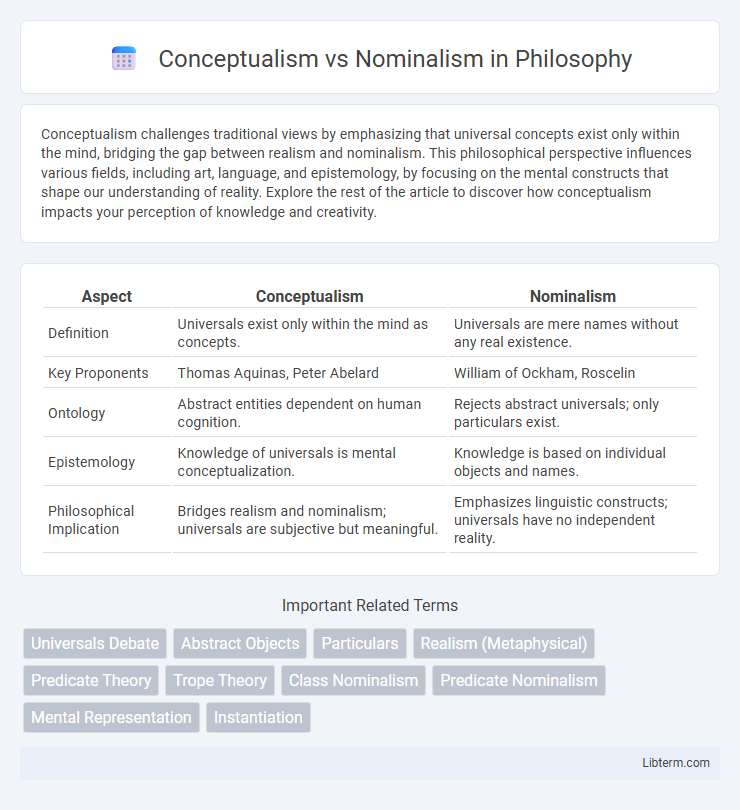Conceptualism challenges traditional views by emphasizing that universal concepts exist only within the mind, bridging the gap between realism and nominalism. This philosophical perspective influences various fields, including art, language, and epistemology, by focusing on the mental constructs that shape our understanding of reality. Explore the rest of the article to discover how conceptualism impacts your perception of knowledge and creativity.
Table of Comparison
| Aspect | Conceptualism | Nominalism |
|---|---|---|
| Definition | Universals exist only within the mind as concepts. | Universals are mere names without any real existence. |
| Key Proponents | Thomas Aquinas, Peter Abelard | William of Ockham, Roscelin |
| Ontology | Abstract entities dependent on human cognition. | Rejects abstract universals; only particulars exist. |
| Epistemology | Knowledge of universals is mental conceptualization. | Knowledge is based on individual objects and names. |
| Philosophical Implication | Bridges realism and nominalism; universals are subjective but meaningful. | Emphasizes linguistic constructs; universals have no independent reality. |
Introduction to Conceptualism and Nominalism
Conceptualism asserts that universals exist only within the mind as concepts, mediating between the extremes of realism and nominalism. Nominalism denies the existence of universals altogether, asserting that only individual objects are real and that universals are mere names or labels. The debate between conceptualism and nominalism centers on the ontological status of universals and their role in human cognition and language.
Historical Background of the Debate
The historical background of the Conceptualism vs Nominalism debate traces back to medieval scholastic philosophy, with key contributions from thinkers like William of Ockham and John Duns Scotus. Conceptualism, which emerged as a middle ground, argued that universals exist only in the mind as concepts, while Nominalism denied the existence of universals altogether, treating them as mere names without inherent reality. This debate significantly influenced the development of metaphysics and epistemology in the late Middle Ages and set the stage for modern philosophical inquiry.
Core Principles of Conceptualism
Conceptualism asserts that universals exist only within the mind as conceptual constructs, mediating between the extremes of realism and nominalism. It emphasizes the mental abstraction process where concepts represent shared features of individual objects without existing independently outside cognition. This core principle distinguishes conceptualism by maintaining that universals are neither external realities nor mere names but mental entities shaped by human understanding.
Fundamental Tenets of Nominalism
Nominalism posits that universals are mere names without any independent existence, emphasizing that only particular objects exist concretely. It asserts that abstract concepts do not have inherent reality but are linguistic constructs used for convenience in categorizing sensory experience. This perspective challenges the notion of shared essences, prioritizing individual entities as the basis of all knowledge and understanding.
Key Philosophers and Their Perspectives
Conceptualism, represented by philosophers like John Locke and Peter Abelard, argues that universals exist only within the mind as concepts but have no independent external reality. Nominalism, championed by William of Ockham, denies the existence of universals altogether, asserting that only individual objects are real and that universals are merely names or labels without ontological status. Both positions critically challenge Realism by rejecting the independent existence of universal forms outside human cognition.
The Role of Universals in the Controversy
Conceptualism asserts that universals exist as mental constructs derived from individual objects, emphasizing the cognitive role in forming general ideas. Nominalism denies the independent existence of universals, contending that only particular objects exist and that universals are mere names without ontological status. The debate centers on whether universals have a real, abstract existence or are simply linguistic labels applied to shared characteristics among particulars.
Conceptualism vs Nominalism: Main Arguments
Conceptualism argues that universals exist only within the mind as concepts, serving as intermediate entities between realism and nominalism. Nominalism denies the existence of universals altogether, asserting that only individual objects and their names exist without any inherent abstract forms. The main debate centers on whether universals have any ontological status beyond mental constructs or linguistic labels.
Implications for Metaphysics and Epistemology
Conceptualism asserts that universals exist only within the mind as concepts, impacting metaphysics by rejecting the independent existence of abstract entities and thus influencing epistemology through emphasizing mental constructs in knowledge formation. Nominalism denies the existence of universals altogether, holding that only particular objects exist, which reshapes metaphysical debates by eliminating abstract universals and directs epistemology toward language and naming as primary tools for organizing experience. These differing stances affect theories of reality and knowledge, with conceptualism bridging the gap between realism and nominalism, while nominalism challenges the ontological status of universals, restricting knowledge to empirical particulars.
Criticisms and Counterarguments
Criticisms of Conceptualism highlight its reliance on mind-dependent universals, which some argue undermines the objective existence of abstract concepts, challenging its ability to explain shared properties across distinct entities. Nominalism faces criticisms for denying real universals, leading to difficulties in accounting for the commonalities observed in objects without invoking abstract entities, which some deem counterintuitive or insufficient for scientific explanations. Counterarguments to these positions include Conceptualists' assertion that universals exist only as mental constructs enabling cognition, while Nominalists argue that linguistic or conceptual categories suffice for explaining resemblance without committing to metaphysical universals.
Contemporary Relevance and Future Directions
Conceptualism and nominalism continue to shape contemporary philosophical debates on the nature of universals and the foundations of language and cognition. Current research explores their implications for artificial intelligence, cognitive science, and epistemology, emphasizing how conceptual frameworks influence knowledge representation and categorization. Future directions involve integrating insights from neuroscience and computational modeling to refine understanding of mental concepts and their linguistic expressions.
Conceptualism Infographic

 libterm.com
libterm.com